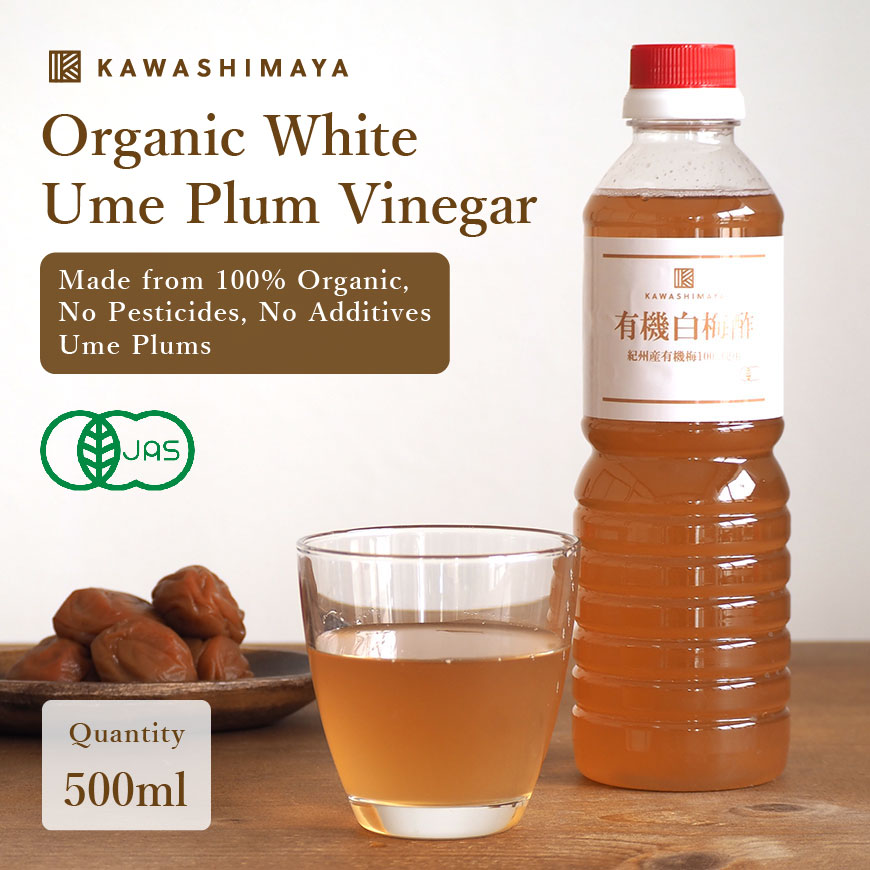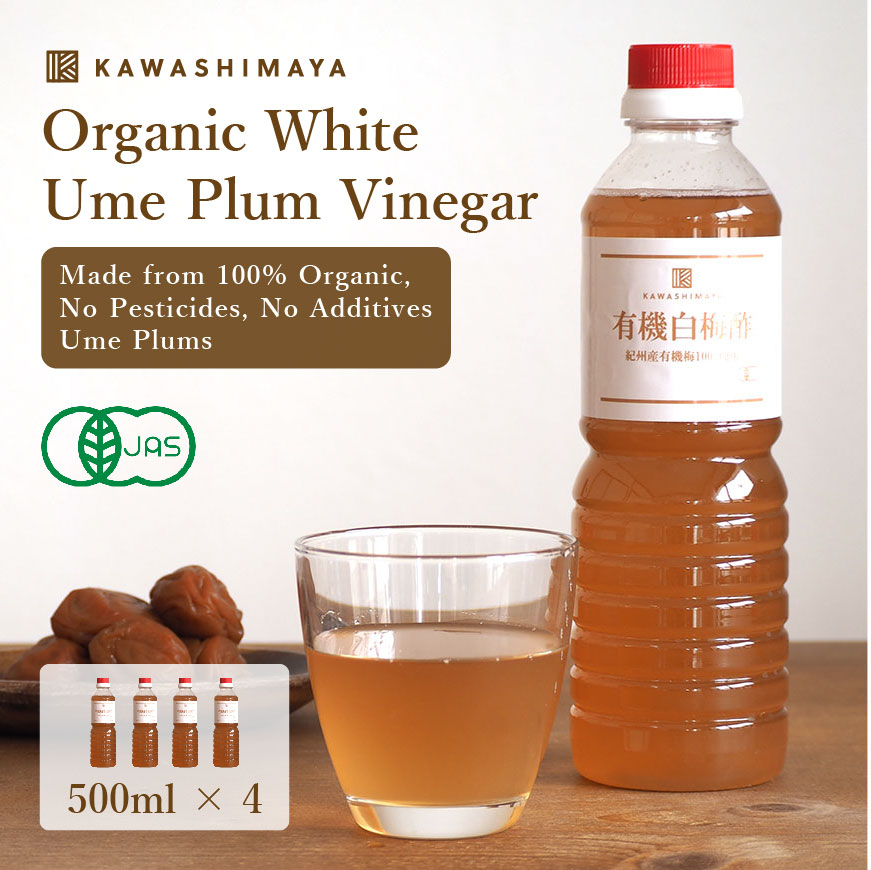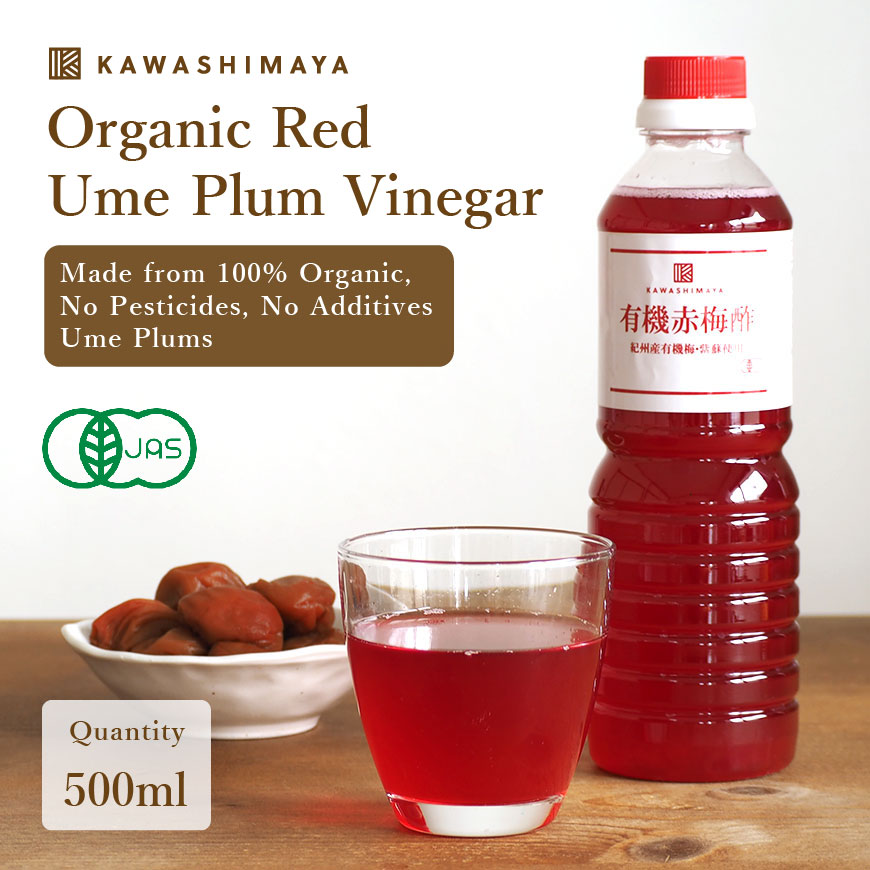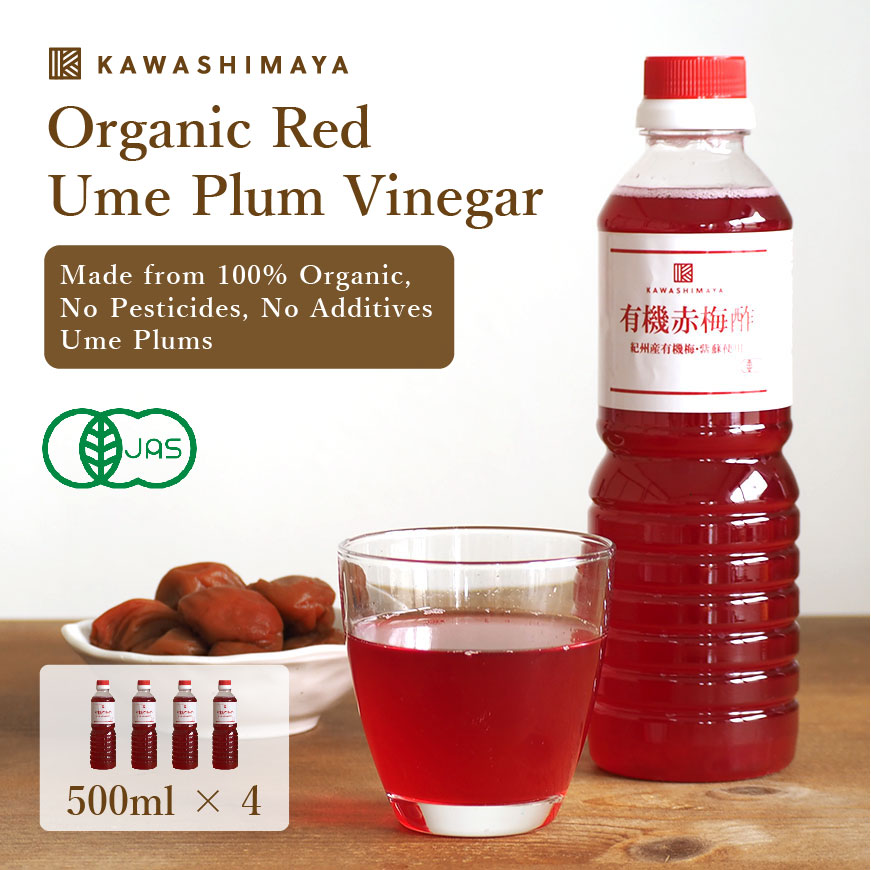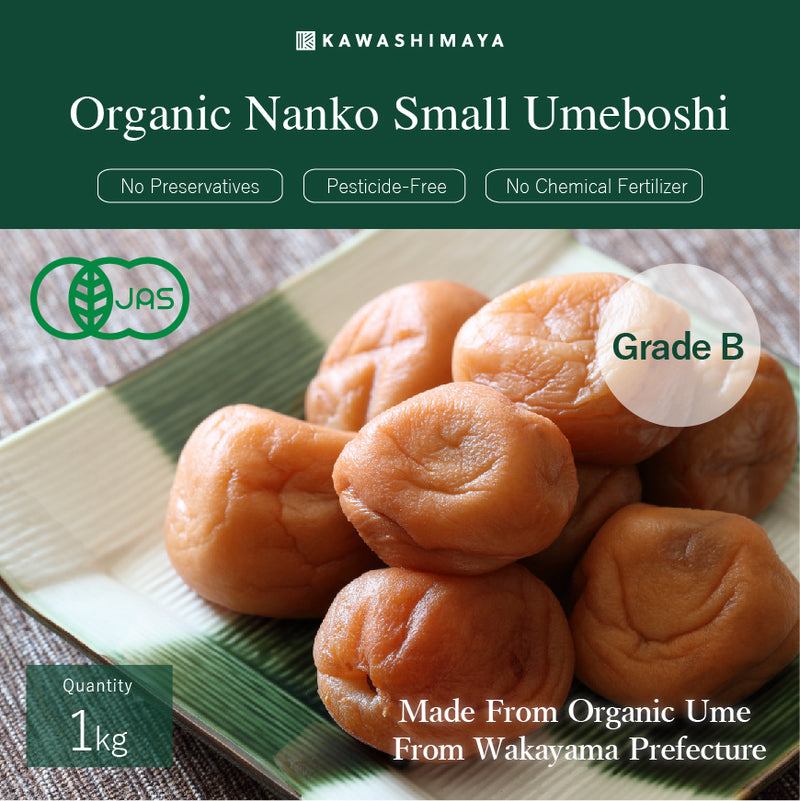
Organic Small Nanko Umeboshi Plum (Grade B) 1kg - Additives-Free, Pesticide-Free, Chemical Fertilizer-Free - Product of Wakayama Prefecture
In stock
Organic Small Nanko Umeboshi (Grade B)
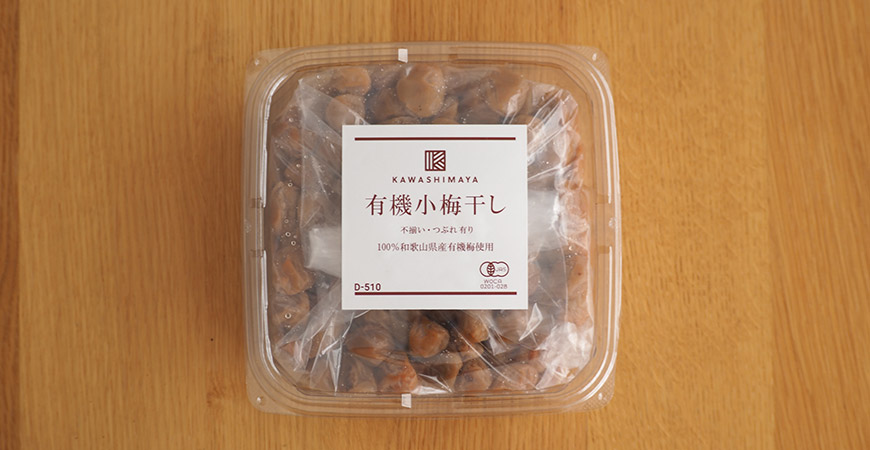
The home of Kishu Nanko Ume is Tanabe City and Nambu Town in Wakayama Prefecture. This umeboshi is a three-year-old umeboshi that has received organic JAS certification, which is rare among the authentic Kishu umeboshi.
Grade B Umeboshi is a selection of pickled plums that have a crushed shape or a sparse appearance. The taste is not inferior to that of regular umeboshi, so please just consider it as the more economical option.
At Takeuchi Farm, in order to deliver safe and secure plums to our customers.
We use wood vinegar, which can be taken from nature, as an organic pest repellent, we also use garlic, fish, oysters and other pickled stuff as foliar spray.
This umeboshi was soaked in natural salt with plenty of minerals and slowly dried in the sun. It is a traditional sour umeboshi. (Salt content 18%.)
Please enjoy the old-fashioned, simple, delicious, and genuine taste of umeboshi without chemical seasonings.
Small Umeboshi That Is Perfect For Rice Balls And Other Foods
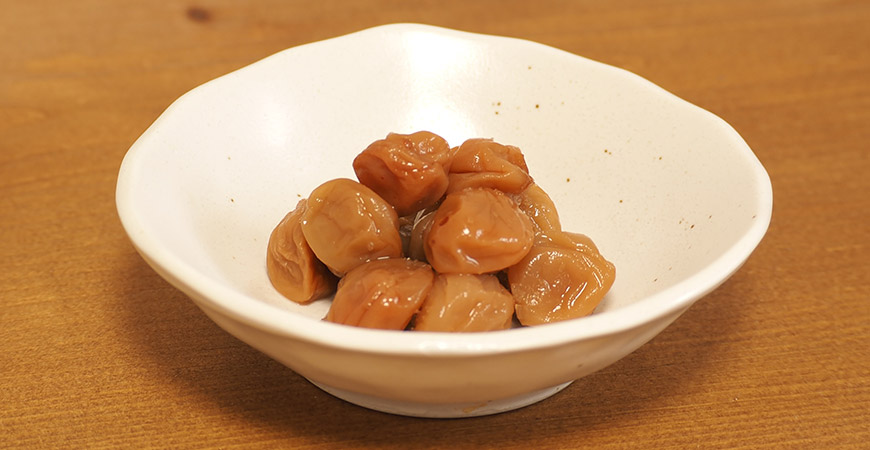
Small umeboshi, which is about half the size of regular umeboshi, is the perfect size for rice balls and bento boxes.
This is a food that is recommended for those who love traditional old-fashioned umeboshi that are not seasoned with honey or chemical seasonings.
Safe Umeboshi That Has Acquired Organic JAS Certification
Plums are susceptible to diseases and are easily eaten by insects, so it is common to use pesticides. However, during the cultivation we do not use any pesticides or chemical fertilizers so that you can enjoy traditional Japanese foods more safely and with peace of mind.
By acquiring organic JAS certification, its high safety is recognized in Japan.
Customer’s Reviews

I purchased it to use in my bento
It's a delicious pickled plum. I purchased it to make bento. I knew it was a small ume, it really is small sized. I bought it because of the cheaper price, but in the end I still prefer the big ones. Although it is delicious. I just ate about 5 of them.Mrs. Akamizuki(Female In Her 30s)

The original taste of pickled plums without additives
Recently, umeboshi has a lot of low salt content, and many of them are pickled with honey and shiso, so I was in trouble because I couldn't get the umeboshi I wanted. I happened to find and purchase this small umeboshi from Kawashimaya. The first flavor when you put it in your mouth is delicious! It's more than I expected.Tomoppe(Female In Her 40s)

Old-fashioned pickled plums that are not sweet.
At supermarkets, most of the umeboshi is seasoned with honey or sweet umeboshi with starch syrup, so this umeboshi is really delicious.Mrs. Yamauchi(Female In Her 40s)
Rare Umeboshi That Is Proven Safe
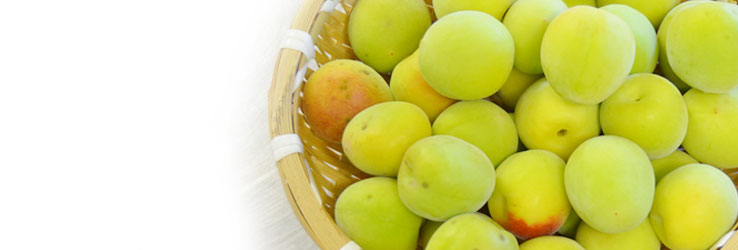
It is common to use pesticides and fertilizers to grow plums. This is because plums that look beautiful and have no spots or stains are preferred.
Plums that look bad and have spots and stains are considered not as valuable and no one wants to make them. So, does the taste of ume grown normally and ume grown organically change? Turns out, plums that are grown without pesticides and fertilizers have stronger taste, and can be made into delicious umeboshi.
Takeuchi Farm's three-years-aged umeboshi has acquired organic JAS certification.
A registered accreditation body inspects that the production of organic foods conforms to the JAS standard, and only certified businesses can affix the organic JAS mark.
It is prohibited by law to label regular agricultural products and processed agricultural products with the term “organic” if they are not certified and have the official JAS mark.
The certification mark represents foods produced by the power of nature without relying on chemical substances such as pesticides and fertilizers, and is attached to agricultural products and processed foods.
Organic Umeboshi That Cannot Be Mass-Produced
Organic Umeboshi cannot be mass-produced. They are limited because they are cultivated without using pesticides or fertilizers.
The small amount of organic plums is pickled, dried in the sun, and aged in plum barrels. There is a limit to the number of plums that can be produced after such a difficult task.
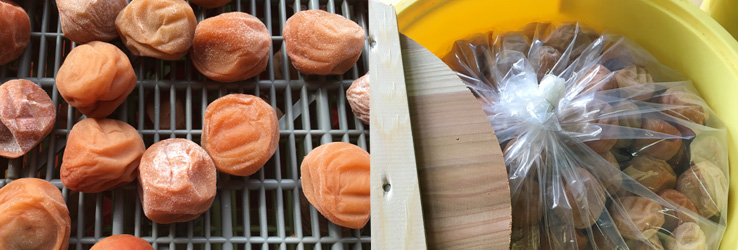
Organic Kishu Nanko Ume Plum: Maker Introduction
Takeuchi Farm is particular about making Nanko Ume in Tanabe City, Wakayama Prefecture, the home of Kishu Nanko Ume. Plum is a fruit that is processed as a whole, so we are working on the motto of safety and security.
In order to prevent damage from insects, in addition to natural repellents such as wood vinegar, fish, crabs, garlic, turmeric and other good foods are collected, pickled, and fermented to make homemade liquid fertilizer.
Natural plum, just as they are, are harvested in the morning and shipped the same day.
Try making umeboshi, juice, jam, and plum wine using our fresh high-quality plum.
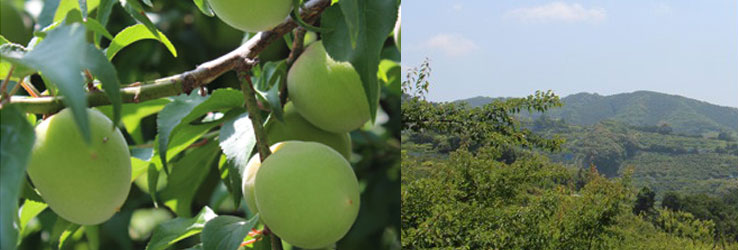
Tanabe City, Wakayama Prefecture, is blessed with a warm climate with little change in temperature throughout the year due to the influence of the Kuroshio Current flowing into the Kii Strait. In addition, this place is most suitable for the characteristics of plums because of the heavy rainfall and long daylight hours.
Medium-quality soil is required to cultivate good quality plums, and it absorbs a large amount of calcium during the growing season. Gourd stone, which is often found in this area, is made of calcium carbonate and is a medium-quality soil that contains a large amount of calcium required for plums.
Takeuchi Farm cultivates high-quality ume in a place that is ideal for making ume, with a focus on organic and special cultivation. From cultivation to harvesting, packaging, and shipping are all done by hand at Takeuchi Farm.
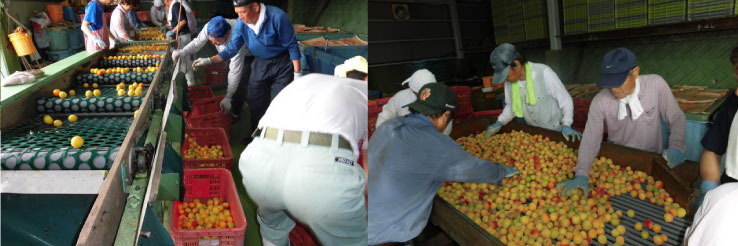
Since it is ripened on the tree, the plums are easily scratched when using a fruit sorter, unlike the one harvested while it’s unripe, so we manually sort the fruits by hand according to the two standards, large and small.
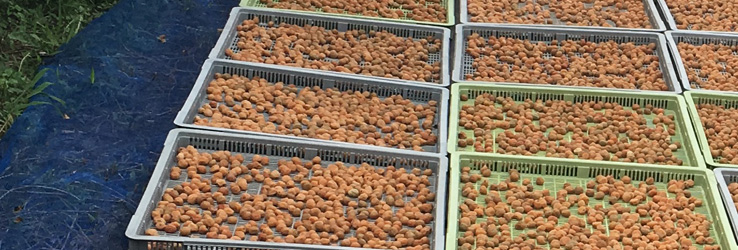
Among the selected plums, we carefully select each one and deliver it to our customers with all our heart.
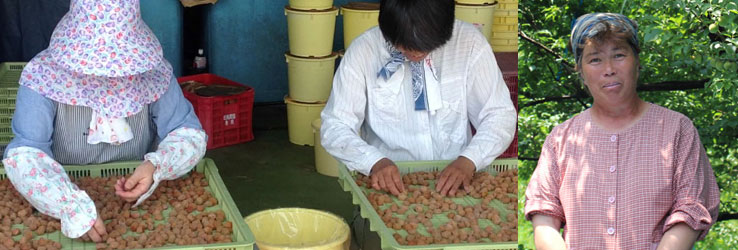
Product Variations
-
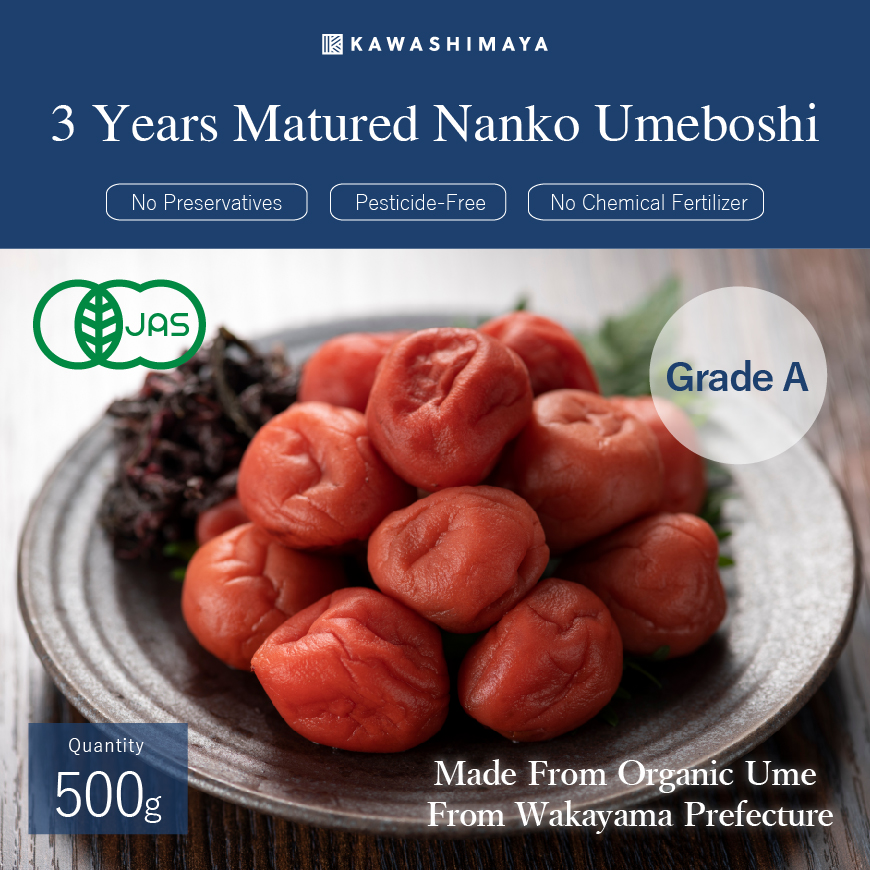
3 Years Matured Umeboshi (Grade A)
500g -
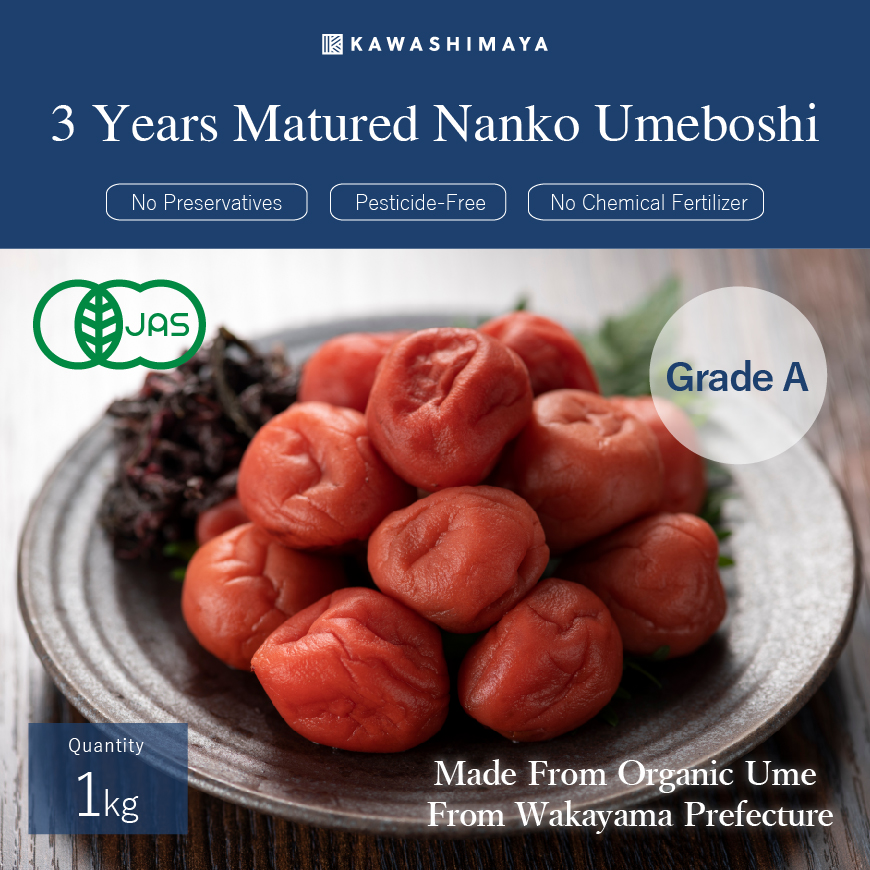
3 Years Matured Umeboshi (Grade A)
1kg -
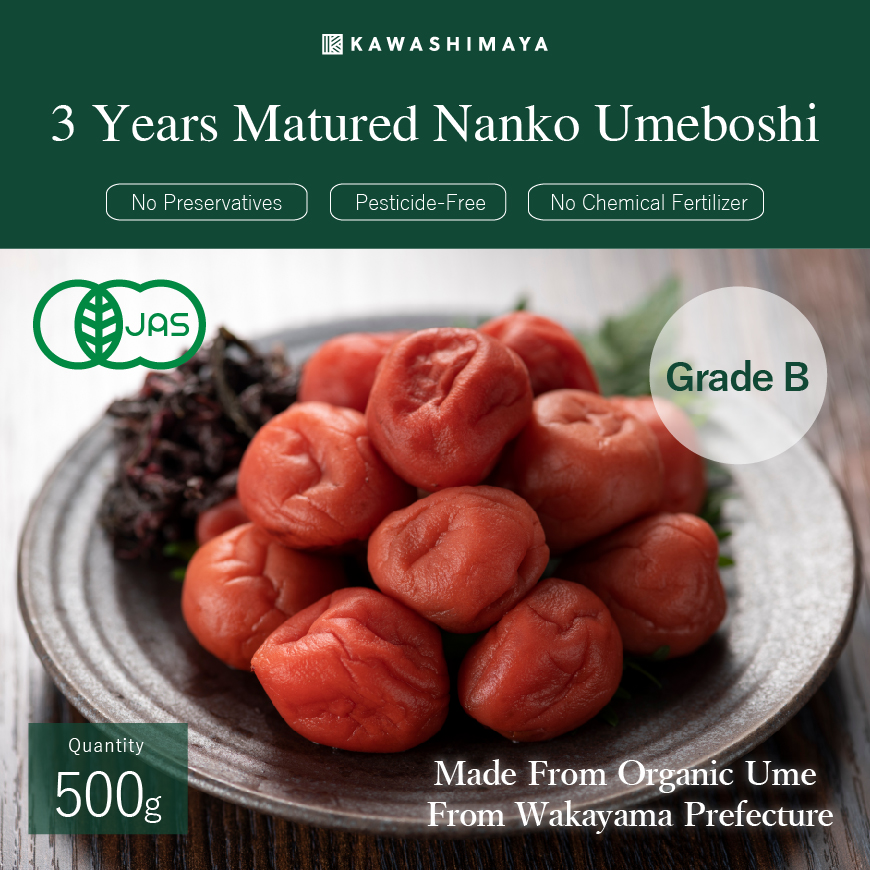
3 Years Matured Umeboshi (Grade B)
500g -
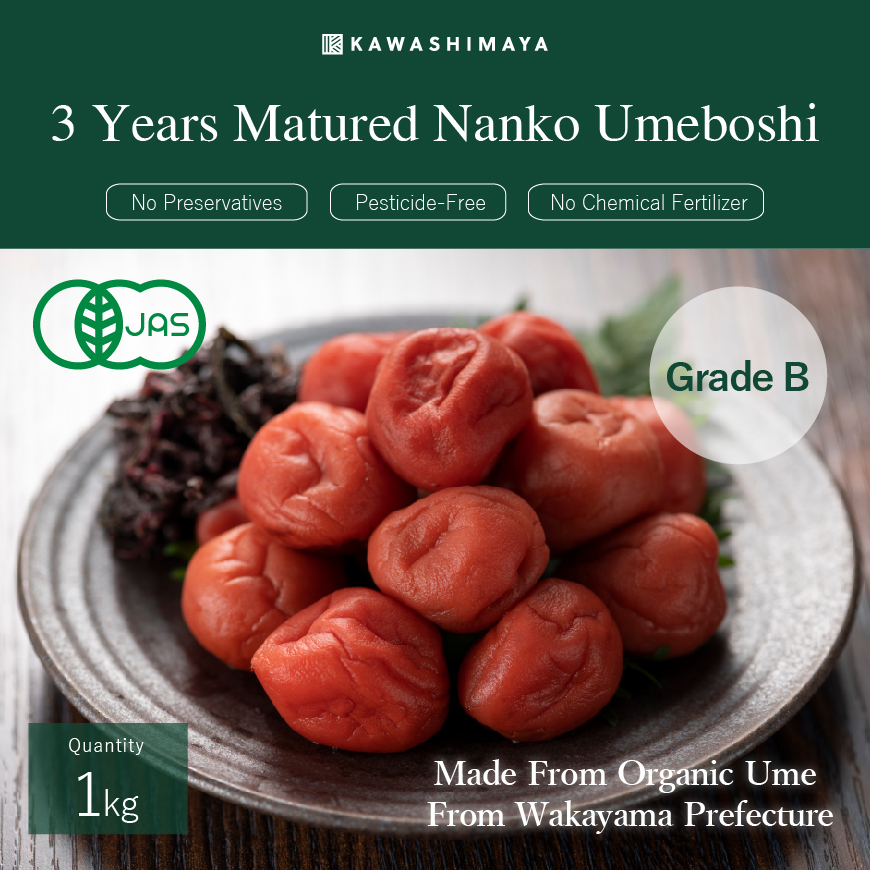
3 Years Matured Umeboshi (Grade B)
1kg -
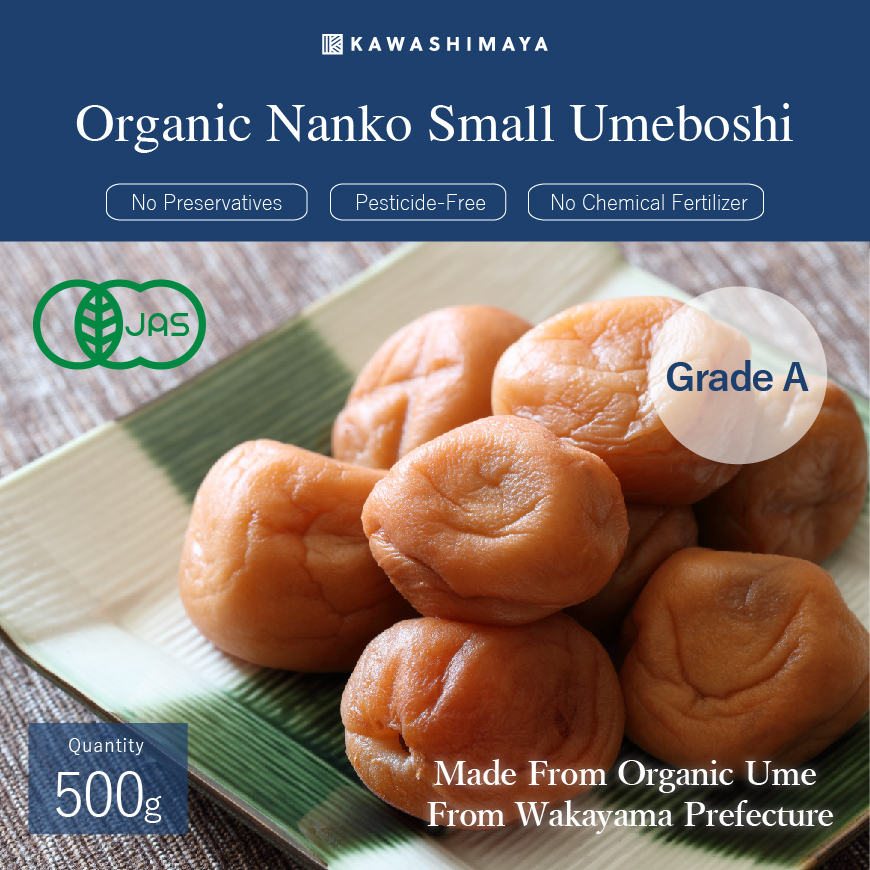
Organic Small Umeboshi (Grade A)
500g -
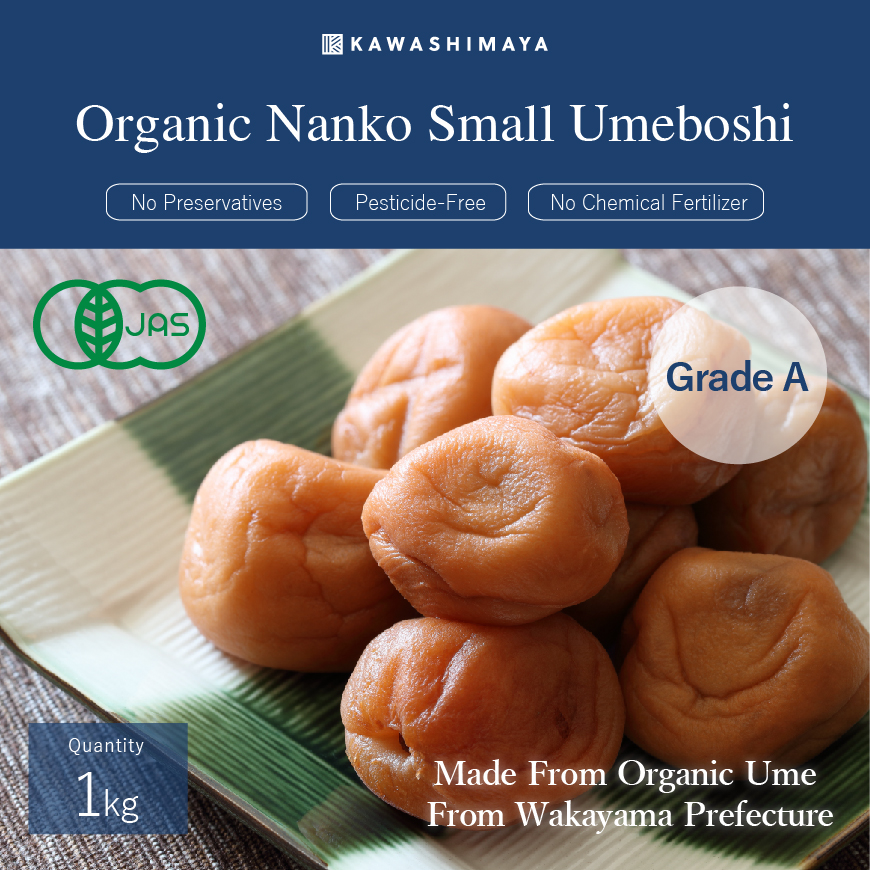
Organic Small Umeboshi (Grade A)
1kg -
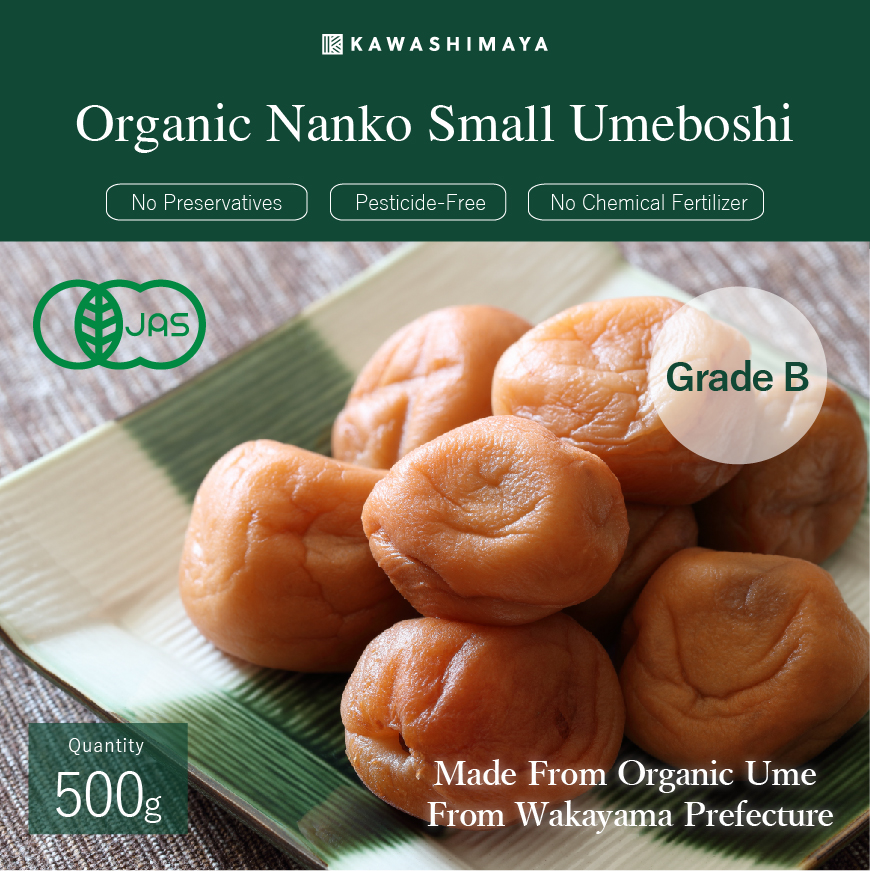
Organic Small Umeboshi (Grade B)
500g -
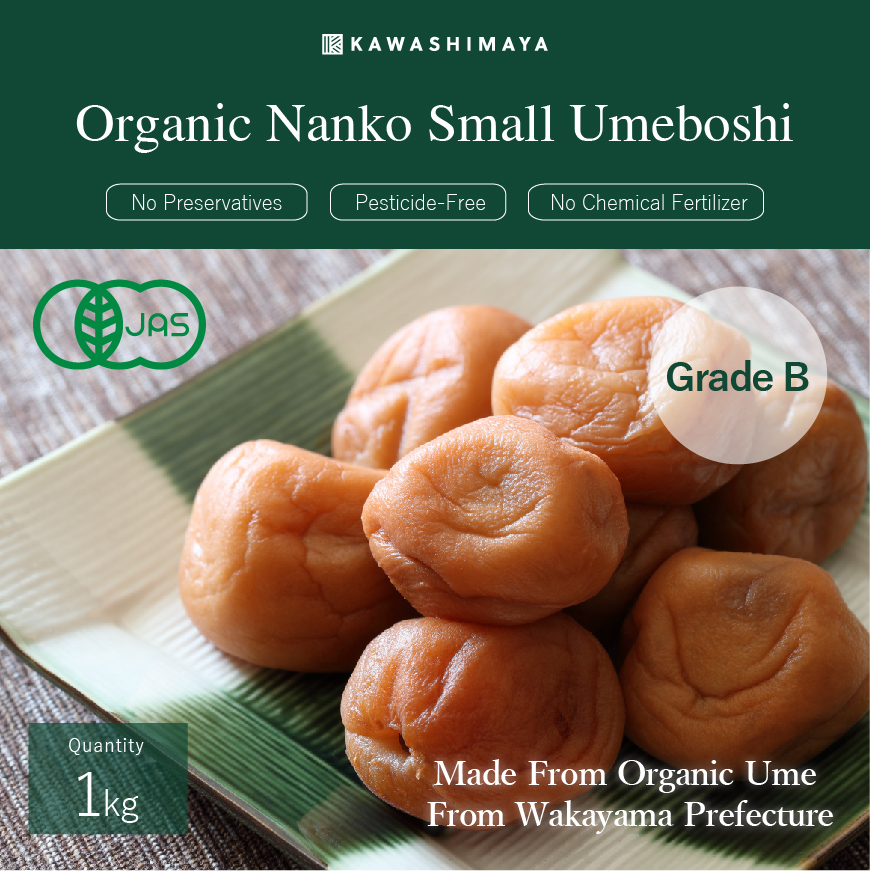
Organic Small Umeboshi (Grade B)
1kg
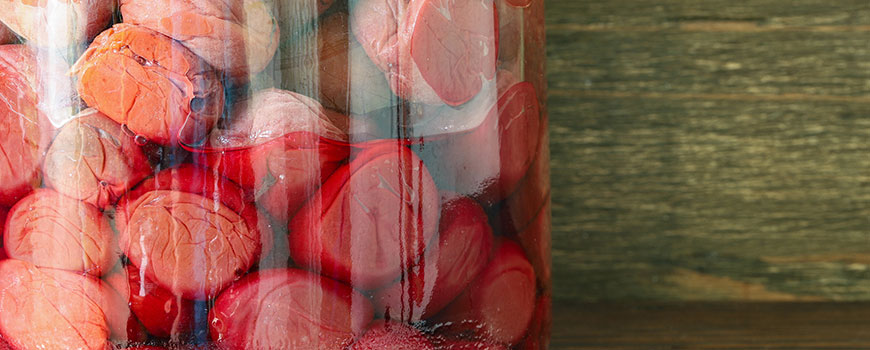
Enjoy With Ume Vinegar
Ume vinegar helps to keep the freshness of umeboshi plum by soaking it in the vinegar. Feel free to try these product together
Find Out More About Umeboshi
Get to Know Umeboshi, the Japanese Salted Plums
Have you tried umeboshi? What is umeboshi? In Japan, umeboshi is an essential everyday foodstuff. It is not only enjoyable on its own, but the medicinal effects caught worldwide attention. Vegans are also gaining interests in this superfood because of the abundant nutrients.
How To Make Umeboshi
With this original recipe by Kawashima the Japan Store, we hope you enjoy this how-to of a very traditional Japanese preserved food! The following article will also explain what umeboshi is, the steps to make delicious pickled plums and creative umeboshi recipes for you to try out.
Product Detail
| Ingredients | Organic Nanko Ume(Made In Wakayama, Japan), Salt |
|---|---|
| Quantity | 1kg |
| Storing Guide | Keep in refrigerator after opening |

Why shop with KAWASHIMAYA?
- We sell only authentic and high-quality products
- 100% Made in Japan products are as listed
- Organic and non-GMO products are as listed
- All products are new and have long expiry date
- All products are handled directly from our warehouse in Tokyo, Japan
- Easy and secure payment options with CC or PayPal
- Safe and insured international shipping methods
- English and Japanese customer support by email
- Wholesale discount prices available for selected products
- Find insightful articles from KAWASHIMAYA Blog
- Get exclusive discounts for KAWASHIMAYA Newsletter subscribers
- Easy shop on KAWASHIMAYA Amazon USA

